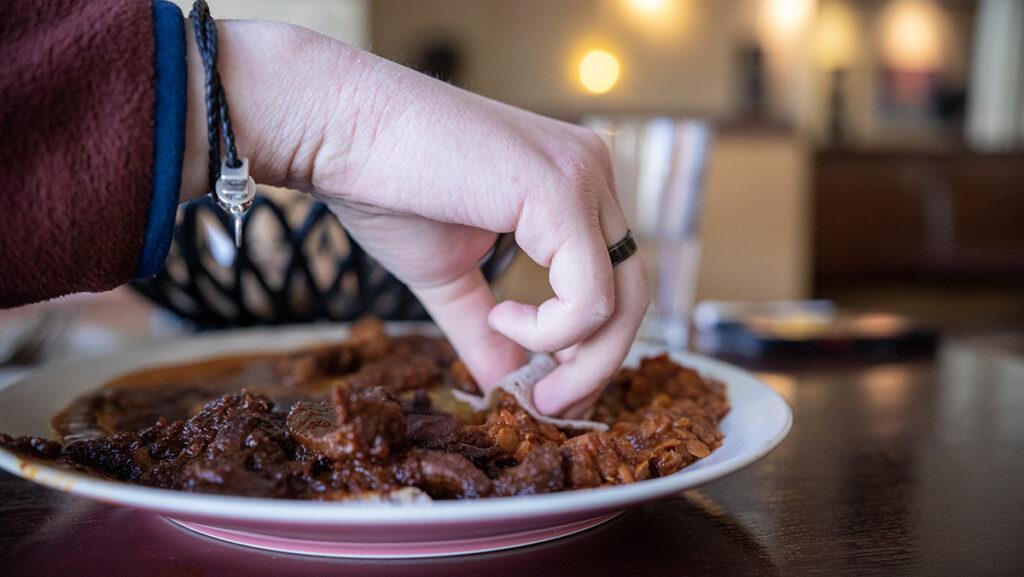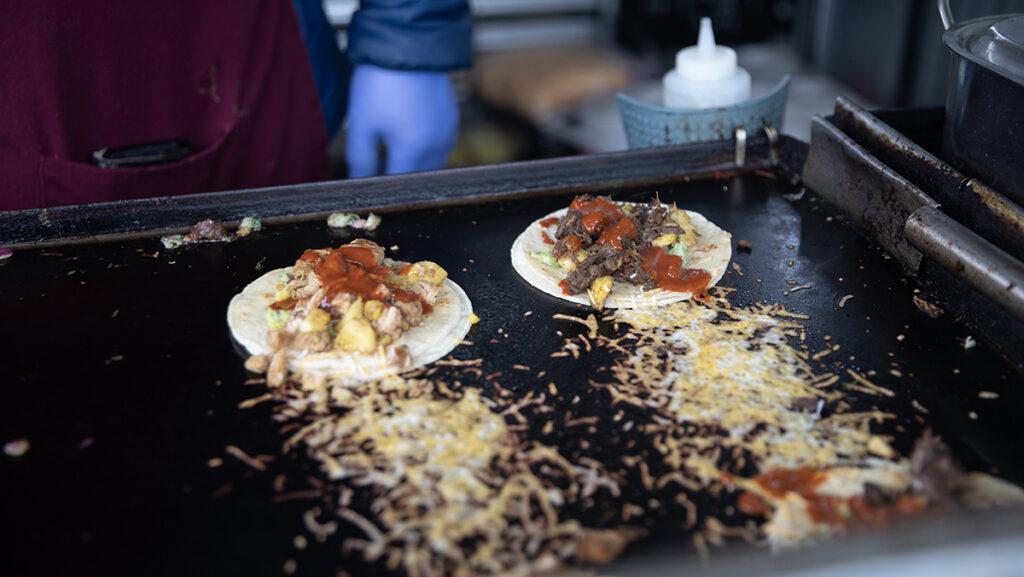Immediately upon stepping into the tidy seating area, locals and foodies alike are greeted with the fresh smell of spices, meat and veggies being prepared. The checkered floor, delicate paintings and light music help make this restaurant feel as cozy as can be for people of all ages.
Conveniently located on 113 S Cayuga St. right near The Commons, Hawi Ethiopian Cuisine aims to bring the traditional dishes of Ethiopia to Ithaca — and it succeeds with flying colors. The restaurant first opened in 2015 and has been filling the stomachs of Ithaca residents ever since. There’s no other place like it in the area, with the nearest Ethiopian restaurant located an hour away in Syracuse.
As the gracious servers tell customers, Ethiopian food has its own unique etiquette of eating with one’s hands. The main dish is served with a large piece of injera, a soft teff-flour-based bread laid under the meal. It’s typical for Ethiopians to consume this bread on a daily basis. A variety of spices, meat and veggies are placed on top of it. With an extra basket of injera, Ethiopians break off a piece of the bread and dip it into the steaming hot food on their plate. It’s even better that way.
There are plenty of choices on the menu with options for meat lovers, vegetarians and vegans alike. Each food item also has a label indicating how spicy it is, ranging from mild to medium to hot, which is extremely helpful for people who do not want to eat super spicy food. Each table gets an unlimited serving of injera and in the past, the restaurant has offered gluten-free bread if customers call in advance, although they are currently not able to serve that because of understaffing issues. It’s clear that Hawi Ethiopian Cuisine makes great efforts to be inclusive in its food selection.
For appetizers, the crunchy wrap Sambusa is a great starter option, with the ability to fill the shells with lentils, chicken or beef. The creamy dipping sauce that it’s served with adds a nice kick of flavor without taking away from the succulent meat. Sambusa is also one of the cheaper options on the entire menu, costing just $5 for two delicious pieces.
When looking at the main course, there are multiple choices that can satisfy any hungry stomach. While some other U.S.-based Ethiopian restaurants exclusively offer platters of pre-chosen meats and veggies, Hawi Ethiopian Cuisine gives customers a choice with some dishes to select their own meat and veggies. And the choice can be quite overwhelming with so many to choose from.
The first option is an entree for one, with the ability to select one meat or one veggie for the main portion and two smaller portions of veggie on the side. The veggie combo is a great option for vegans, including all seven veggies offered: Misir Wat, Yater Kik Alicha, Shiro, Keysir, Gomen, Yata Kilt Alicha and Fasolia. The meat combo allows for more variety with two meats and three veggies.
The lamb is always an excellent choice, with the Yebeg Alicha cooking lamb cubes in onion stew and the mediumly spicy Yebeg Wat providing a special hint of tomato. For chicken, the Doro Tibs is a go-to choice. The Doro Wat is also great, but it can be difficult to eat it with injera since it’s a drumstick and egg. If that sounds appetizing, make sure to ask for a fork. And for beef, the Tibs and the spicy Tibs Wat are always perfectly cooked beef cubes, with just the right amount of crunch and juicy flavor. Any meat platter is missing without at least one choice of beef.
The veggie sides also offer terrific options for non-meat eaters, with the Misir Wat, Kik and Shiro being the best choices. But don’t overlook the Gomen: even for people who may not typically eat vegetables, the impressively cooked diced greens add a unique mix of flavor to any Ethiopian dish. There’s really no way to go wrong, though, and coming back multiple times allows for the great luxury of trying new meats and veggies on the menu.
The food is admittedly on the pricier side, with the meat dishes ranging from $17.50–$19.50 a piece and the chef specials all costing $22.50. With an appetizer or drink alongside it, the money can quickly add up. So while Hawi Ethiopian Cuisine may not be affordable enough to frequent every few weeks, it’s a great place to revisit every few months. And after trying any entree or dish just once, customers may very well find themselves having a new craving to fill, with the extra satisfaction of supporting a local business.














